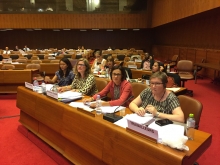ILO Tripartite Technical meeting adopts the General Principles and Operational Guidelines on Recruitment

The Principles and Guidelines can help dramatically change the current situation and reduce exploitation, forced labour and vulnerability of millions of workers across the world, including migrant workers, to traffickers and unscrupulous labour recruiters and employers.
Strongly anchored on international norms and labour standards, the Principles and Guidelines cover both public and private recruitment, including recruitment conditions in public procurement. They will provide guidance to national, regional, global codes and practices on recruitment, including industry-led self-accreditation.
For PSI, the adoption of the ILO Principles and Guidelines is a big win for public service workers worldwide.
Demographic change, along with workforce shortages, particularly in the health and social care sectors, will increase international recruitment in the coming years. The ILO Guidelines and Operational Principles on Recruitment will provide guidelines on standards, as well as an advocacy tool to ensure fair recruitment that is ethical and based on international norms and standards.
The Principles and Guidelines support our advocacy towards ethical recruitment, addressing the social justice and development impact of unethical recruitment in depleting the critical workforce in developing countries.
The Principles and Guidelines include a breakthrough principle that "no recruitment fee or other costs should be charged to workers and job-seekers”. This can dramatically change the rampant abuse and exploitation arising from exorbitant recruitment fees charged to workers by unscrupulous labour recruiters. The principle applies to all workers without discrimination or exemption, applies to all workers, whether low skilled or highly skilled, in the private or public sectors. This is a step further than what is stipulated in the ILO Convention 181 (Private Recruitment Agencies Convention).
The Principles and Guidelines promote human and trade union rights for all workers, including access to information, right to join trade unions, collective bargaining and decent working and living conditions. They provide for the protection of whistle-blowers in reporting cases of abuses in recruitment practices, as well as access to grievance, redress and compensation for workers’ whose rights were violated. Governments must ensure that such mechanisms for redress are accessible across borders, even after the worker has returned to his/her own country.
The Principle and Guidelines promote the mutual recognition of skills and qualifications, an important measure to address brain waste and deskilling of many migrant workers who are forced to accept jobs that are way below their qualifications.
The Principle and Guidelines promote bilateral labour agreements (BLA) and multilateral labour agreements (MLA), including the tripartite involvement in the implementation and monitoring of BLAs and establishment of oversight committees. PSI supports strong government regulation of recruitment agencies, transparency, access of workers to information and active involvement of trade unions in the development, implementation and monitoring of BLAs. Currently, PSI is involved in, and documenting the Germany-Philippines BLA as a case study to promote good practice that can be replicated.
On the refugee and migrant crisis: The Principles and Guidelines promote the protection of human rights of refugees and migrants in the recruitment process; calls on governments to ensure that enterprises, international humanitarian support and cooperation do not violate the human and labour rights of migrants and refugees.
More information:

